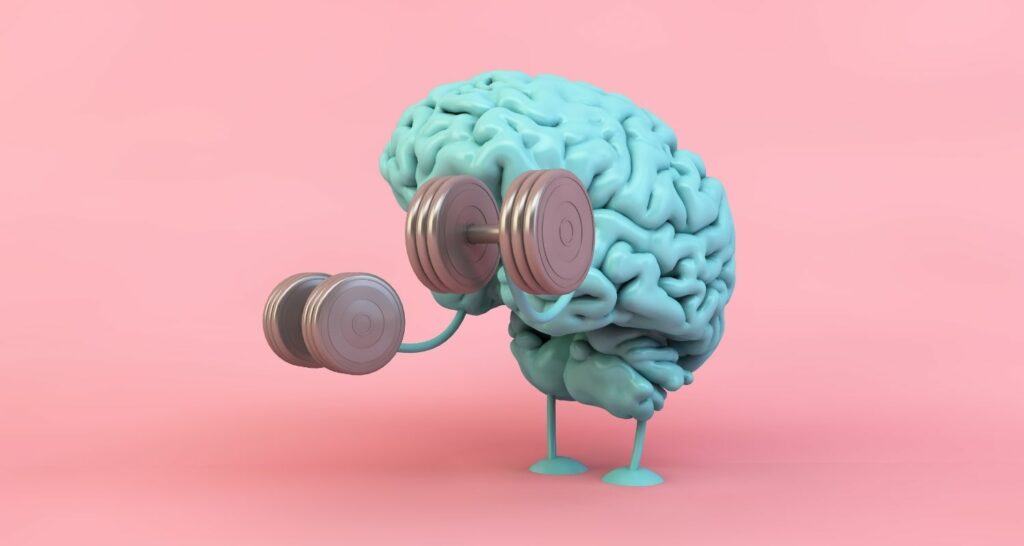Taking care of your brain is kind of a big deal, right? We all want to live long and healthy lives with bodies and brains that stay strong well into our senior years. Which is why I recommend eating a brain-supportive diet and getting lots of regular exercise. We already know that exercise benefits your heart and your mood. But what are the benefits of exercise for the brain? Can working out regularly increase your neuroplasticity and brain-derived neurotrophic factor (BDNF)?
Just in case you needed a few more reasons to schedule that workout, I’m going to discuss how neuroplasticity and BDNF work and why you should make exercise a priority for brain health.
Neuroplasticity Of The Brain
The brain is a complicated place. And up until fairly recently, it was believed that once you reached the age of 25 or so, it couldn’t change any more. That the brain became “fully developed” and fixed.
Now, we understand that the brain can, in fact, be restructured. It can continue to grow, develop, change throughout life.
Which is great news, right?
It means that we never have to be an old dog who can’t learn a new trick.
It also means that after brain injury or difficulties with mood disorders and depression that we have a chance to improve the brain’s ‘wiring’ so to speak — and possibly recover or improve brain function.
What is BDNF?
BDNF is a protein that is found in the brain. It helps to encourage neuroplasticity.
Lower levels of BDNF are associated with multiple sclerosis, Alzheimer’s, and Parkinson’s disease. It’s also believed that BDNF levels play a role in depression.
Higher levels of BDNF appear to correlate with better mental health, memory, and overall cognitive function.
What’s unique about BDNF is that it appears that we have the ability to directly influence the amount of it that is present in our bodies. While the amount that is naturally occurring tends to decrease with age, certain activities can actually flood the brain with BDNF.

How To Increase BDNF In The Brain And Neuroplasticity
The ways that we can increase BDNF are fairly simple, too. Nothing fancy or complicated here, but some powerful ways to get more BDNF and love up on your brain include:
Sunlight
Getting outside for fresh air and sunlight regularly can impact your BDNF levels. During the winter, when sunlight levels are lower, researchers have found lower levels of BDNF concentrations in study participants.
Meditation And Yoga
Practicing yoga and meditation can also improve BDNF levels. Mindfulness is such a powerful tool to reduce stress, and stress can be a BDNF killer.
Sleep
Lack of sleep is another factor associated with lower BDNF levels. Sleep is important and necessary — especially for your brain…so don’t skimp.
Exercise
We know that exercise is so important for your health. But it’s also massively important for your BDNF and brain.
One study showed that just 3-5 weeks of aerobic activity boosted BDNF levels and improved cognitive function.
Another showed that exercise actually increased the volume of the hippocampus, which is a part of the brain that typically shrinks with age.
Supplements For BDNF
There are certain supplements that have been studied for their potential role in helping support healthy BDNF levels.
Omega-3 fatty acids have been studied for their brain-boosting reputation, and results suggest that they positively impact BDNF.
Turmeric, or one of its active compounds, curcumin, has also shown to create an upward swing of BDNF in the brain.
Rewire Your Brain With Exercise
Exercise is one of the most powerful habits you can develop to impact your health in a positive way. There’s just no denying that exercise can boost your heart health, your mood, and even your brain function!
But I totally understand how difficult it can be to start exercising when you feel exhausted all the time. It’s one of the most common complaints I hear from my patients.
I promise that if you can try just a little bit of exercise (walking for 10 minutes is a great start!) and just keep with it, you will start to feel better. With dedication, that 10-minute walk will turn into a 20 minute one, and then — maybe even jogging or cycling.
When you exercise, you’ll start to sleep better, which will impact your energy levels, and in turn, make exercise a bit easier.
And if you’re feeling exhausted all the time with no real explanation, I’d invite you to take my quiz below and see it can help you have an informed conversation with your doctor and get to the root of your health problems.
References
“Brain-Derived Neurotrophic Factor – an overview | ScienceDirect ….” https://www.sciencedirect.com/topics/neuroscience/brain-derived-neurotrophic-factor.
“Brain-derived neurotrophic factor: a bridge between inflammation ….” 29 Nov. 2014, https://www.ncbi.nlm.nih.gov/pmc/articles/PMC4273623/.
“Brain-derived neurotrophic factor and its clinical … – NCBI – NIH.” 11 Dec. 2015, https://www.ncbi.nlm.nih.gov/pmc/articles/PMC4697050/.
“The Role of BDNF on Neural Plasticity in Depression – NCBI – NIH.” 15 Apr. 2020, https://www.ncbi.nlm.nih.gov/pmc/articles/PMC7174655/.
“Brain-derived neurotrophic factor, but not body weight, correlated ….” 13 Feb. 2014, https://pubmed.ncbi.nlm.nih.gov/24524285/.
“Serum BDNF Concentrations Show Strong Seasonal … – NCBI – NIH.” 2 Nov. 2012, https://www.ncbi.nlm.nih.gov/pmc/articles/PMC3487856/.
“Yoga, Meditation and Mind-Body Health: Increased BDNF, Cortisol ….” 26 Jun. 2017, https://www.ncbi.nlm.nih.gov/pmc/articles/PMC5483482/.
“The Effect of Mindfulness-Based Intervention on Brain-Derived ….” 15 Sep. 2020, https://www.ncbi.nlm.nih.gov/pmc/articles/PMC7522212/.
“Brain-Derived Neurotrophic Factor and Neuropsychiatric Disorders.” https://www.ncbi.nlm.nih.gov/pmc/articles/PMC3310485/.
“The Brain-Derived Neurotrophic Factor: Missing Link Between Sleep ….” 28 Nov. 2019, https://pubmed.ncbi.nlm.nih.gov/31782101/.
“Relationship Between Brain-Derived Neurotrophic Factor … – NCBI – NIH.” 21 Nov. 2017, https://www.ncbi.nlm.nih.gov/pmc/articles/PMC5725585/.
“Aerobic exercise improves hippocampal function and increases ….” 24 Oct. 2011, https://pubmed.ncbi.nlm.nih.gov/21722657/.
“Exercise training increases size of hippocampus … – PubMed – NIH.” 15 Feb. 2011, https://pubmed.ncbi.nlm.nih.gov/21282661/.
“Botanicals as Modulators of Neuroplasticity: Focus on BDNF – Hindawi.” https://www.hindawi.com/journals/np/2017/5965371/.
“Dietary omega-3 fatty acids normalize BDNF levels, reduce ….” https://pubmed.ncbi.nlm.nih.gov/15672635/.
“DHA dietary supplementation enhances the effects of exercise on ….” 17 Jun. 2008, https://www.ncbi.nlm.nih.gov/pmc/articles/PMC3208643/.
“Effects of curcumin on learning and memory deficits, BDNF, and ….” 1 Sep. 2014, https://pubmed.ncbi.nlm.nih.gov/24914461/.


